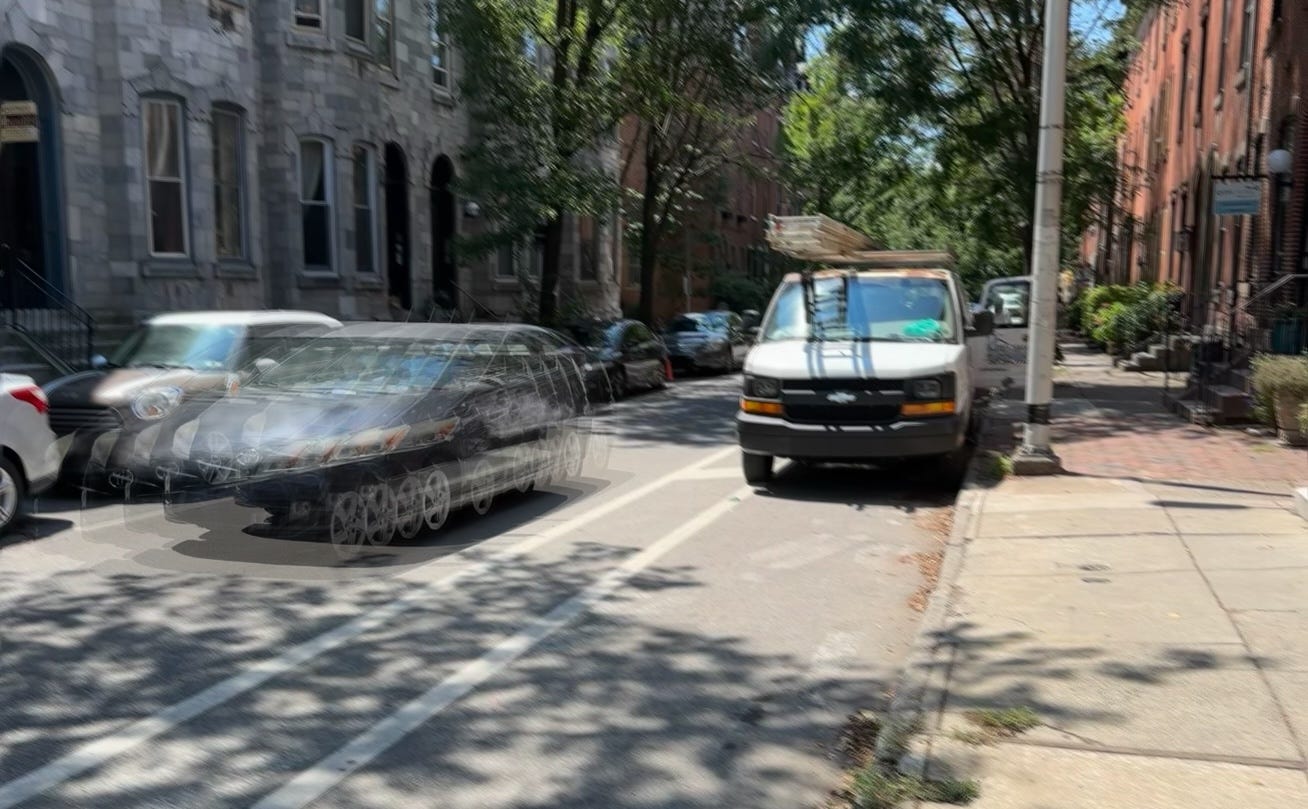Bike Lane Parking Persists in Center City Despite New Loading Zone Initiative
By Rolando Rosa

On July 17, an automobile fatally struck CHOP pediatric oncologist Barbara Friedes while she was riding her bike on Spruce Street.
The tragedy focused the city’s attention on the unsafe road conditions cyclists must endure every day.
In Rittenhouse and Fitler Square, Spruce and Pine Streets are critical arteries for cyclists. Though they have dedicated bike lanes, they’re not protected by effective barriers to keep cars out.
Parking in Bike Lanes
Because these bike lanes lack robust barriers, cars often park or idle in them while making deliveries.
This forces cyclists to swerve into traffic lanes, endangering their safety.
Earlier this year, Philly Bike Action and the Center City Residents Association secured a promising development: the city agreed to convert some residential street parking spaces on Spruce and Pine Streets into loading zones. This measure aimed to reduce illegal parking in bike lanes.
“The problem isn’t [only] the bike lane. The problem is the other side of the street, where there’s residential apartment permit parking,” Philly Bike Action co-founder Caleb Holtmeyer explained. “Some of the spots should be turned into loading zones … so that people don’t feel obliged to use the bike lane when they need to drop things off.”
The city has transformed the first two parking spaces of each block of Spruce and Pine into 30-minute loading zones. The change only applies between the hours of 8am to 6pm. Outside of those hours, the spaces revert to normal parking zones, so that residents can park overnight.
This rollout, however, has not seemed to deter illegal bike-lane parkers. During a recent observation, a reporter counted 3 vehicles parked in the bike lane on just one single block of Pine Street. The newly established loading zone at the southwest corner of Pine and 21st was occupied by a plumbing service van.
Congregational Parking
Cyclists face an additional challenge in Center City: so-called “congregational parking” in bicycle lanes. The Department of Streets grants houses of worship parking permits so that their congregations have ample parking for weekend events, including religious services.
Philly Bike Action has convinced three Center City congregations to not renew these permits, which they consider worthwhile progress.
“I think that’s an achievement,” Holtmeyer said. “It turns out some institutions will change if they’re asked.”
However, at least three other congregations are still requesting bike lane parking permits: Tenth Presbyterian Church, Old Pine Street Church, and Society Hill Synagogue.
Administrator Jim Hess outlined Tenth Presbyterian Church’s stance.
“We appreciate concerns regarding the bicycle lanes...We regularly remind our congregation of the parking rules so that we stay in compliance,” Hess said. “We support the recommendations the Bicycle Coalition made in 2015, including increased enforcement and better signage.”
Hess further explained that reducing danger to cyclists cannot rest on them alone.
“We would love to see better Septa service on Sundays, and we would love for more people to feel safe walking greater distances after dark (after our evening service),” Hess said. “We already subsidize parking at nearby lots as an alternative, however, they do not have the capacity for the portion of our congregation that currently comes by car.”
Ultimately, Philly Bike Action desires common ground with the remaining congregations.
“This isn’t us versus them,” Holtmeyer said. “There’s people that want to bike to church and they can’t because they don't feel safe.”
The organization hopes to persuade the remaining houses of worship to forgo renewing their Sunday parking permits this year
Holtmeyer says Philly Bike Action will conduct a “slow ride” or host a protected bike lane demonstration if the congregations aren’t willing to cooperate. Last summer, Philly Bike Action staged a slow ride to protest Tenth Presbyterian Church’s congregational parking permit.
“That’s something that we don’t do unless we have to, because that’s a lot of time and energy,” Holtmeyer said. “We always prefer to talk and make relationships to discuss the issue.”
Another group, The Bicycle Coalition of Philadelphia, advocates for robust solutions to the city's dangerous streets, including installing permanent concrete barriers on major bike routes and ending weekend parking in bike lanes. The group has launched a petition urging City Council to adopt these and other measures, aiming to eliminate traffic deaths by 2050.

